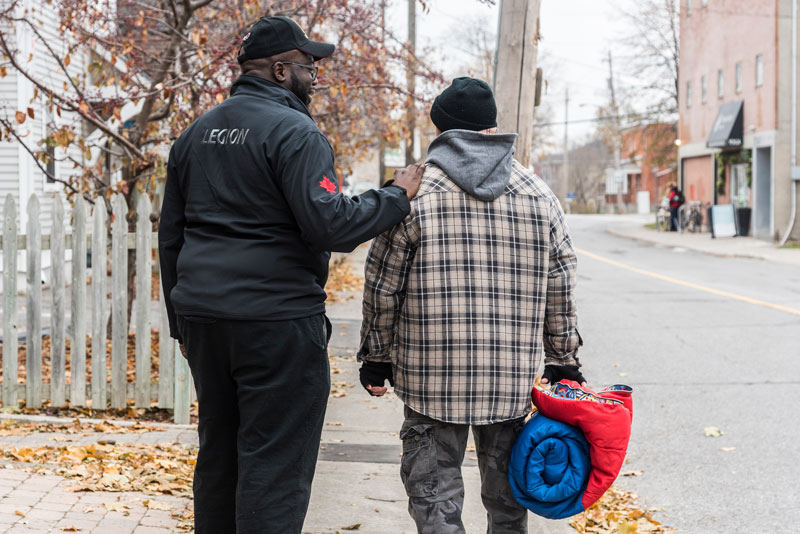Programs to serve and house homeless veterans have continued even as much of the country hunkered down at home throughout the pandemic.
“The pandemic hasn’t slowed down the homeless numbers,” said Ray McInnis, service bureau director of The Royal Canadian Legion.
No one knows for sure how many homeless veterans there are in Canada. Pre-pandemic estimates ranged from 3,000 to 5,000.
The effect the pandemic will have on homeless veteran numbers won’t materialize until the toll of job losses, the end of financial support programs and loss of protection from eviction emerges over the coming months.
What is known is that prior to the pandemic, veterans were over-represented in homeless shelters; although about 1.7 per cent of Canadians are veterans, in 2018 they made up 4.4 per cent of
emergency shelter users.
In Ontario, Operation Leave the Streets Behind has helped some 1,000 homeless veterans, about a tenth of them female, in nearly 200 municipalities since the program started in 2010.
Operation Leave the Streets Behind has helped nearly a thousand homeless veterans.
“The pandemic hasn’t stopped us from working,” said Dave Gordon, chair of the Legion’s Ontario Command Homeless Veterans Program. “We never stopped.”
Ontario Command is now developing regional committees to spread the word about the program and identify ways to work with communities to help homeless veterans.
“We are in the early stages,” said Gordon. The committees will knock on doors of local shelters, police, first responders and municipalities to tell them about the program. After a homeless veteran has been identified, the program can provide food, clothing, financial assistance and other services available in their communities or regions.
In 2012, Ontario’s template was adopted for the Legion’s national Leave the Streets Behind program, which is now operating in six provincial/territorial commands, providing immediate financial support and connecting veterans with social and community services.
Meanwhile, work also continued to increase transitional and long-term housing for homeless veterans. Several new projects have opened since the pandemic began.
In December 2021, the Homes for Heroes Foundation opened its second tiny homes project in Edmonton. The first opened in Calgary in 2019.
ATCO Veterans’ Village provides 20 tiny homes in a village-like setting in an established neighbourhood.
Each tiny home in the community is named after a Canadian soldier who died in service and is less than 28 square metres, but has a kitchen, living room and bedroom. Units are clustered like a neighbourhood and have access to a community garden and communal recreation space where residents can socialize. Residents can use social services and support programs at the on-site resource centre and counsellors’ offices.
Land for the project was donated by the city; Alberta provided $1.1 million in funds, the federal government ponied up $1 million and $2.3 million came from private donations.
The Homes for Heroes Foundation aims to build such projects across the country. By the end of 2022, it hopes to open its third village, which will provide transitional housing for 25 veterans in Kingston, Ont., and is planning projects in other provinces.
One key feature of this program is on-site continuing support, which can include physical and mental health programs, access to services from Veterans Affairs Canada and social agencies, as well as informal peer support, to help veterans rebuild their lives.
In January 2021, the Multifaith Housing Initiative in Ottawa opened the $11.5-million Veterans’ House project on the former site of the CFB Rockcliffe Air Base.
The three-storey, 40-unit building provides on-site mental health and addiction support services. Original plans were to house 16 residents but the project expanded several times in response to growing needs. Homeless veterans are estimated to make up about 8.5 per cent of Ottawa’s homeless shelter clients.
The Canadian Alliance to End Homelessness launched Built for Zero Canada in 2019, a group of about three dozen communities across the country developing a template to end chronic homelessness and veterans’ homelessness.
In October 2020, London, Ont., became the first Built for Zero community to claim functional zero on veterans’ homelessness—that is, the city of 400,000 said it had enough units to house all homeless veterans.
The work isn’t over, John Slugget, service officer with the Legion’s Victory Branch in London, said in an interview at the time.
“Homelessness will always persist, and we need to continue to come together as a community to support these individuals and ensure they remain housed in our community.”
Advertisement




















